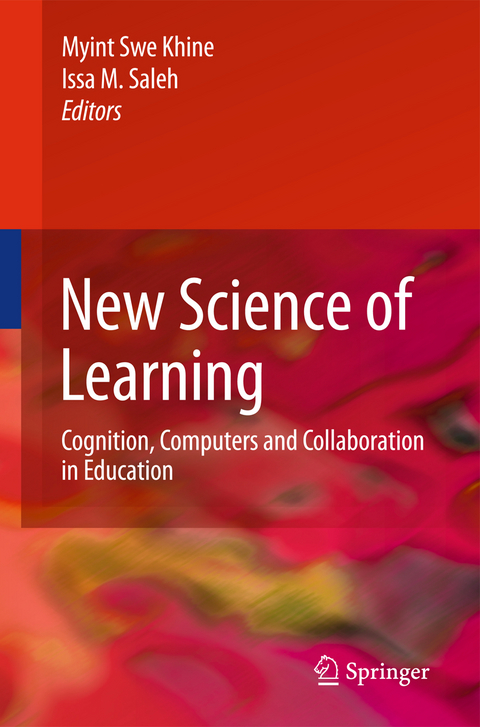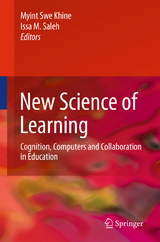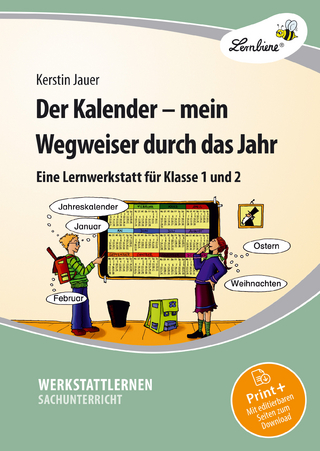New Science of Learning
Springer-Verlag New York Inc.
978-1-4419-5715-3 (ISBN)
The earliest educational software simply transferred print material from the page to the monitor. Since then, the Internet and other digital media have brought students an ever-expanding, low-cost knowledge base and the opportunity to interact with minds around the globe—while running the risk of shortening their attention spans, isolating them from interpersonal contact, and subjecting them to information overload.
The New Science of Learning: Cognition, Computers and Collaboration in Education deftly explores the multiple relationships found among these critical elements in students’ increasingly complex and multi-paced educational experience. Starting with instructors’ insights into the cognitive effects of digital media—a diverse range of viewpoints with little consensus—this cutting-edge resource acknowledges the double-edged potential inherent in computer-based education and its role in shaping students’ thinking capabilities. Accordingly, the emphasis is on strategies that maximize the strengths and compensate for the negative aspects of digital learning, including:
Group cognition as a foundation for learning
Metacognitive control of learning and remembering
Higher education course development using open education resources
Designing a technology-oriented teacher professional development model
Supporting student collaboration with digital video tools
Teaching and learning through social annotation practices
The New Science of Learning: Cognition, Computers and Collaboration in Education brings emerging challenges and innovative ideas into sharp focus for researchers in educational psychology, instructional design, education technologies, and the learning sciences.
Foreword
Robert J. Sternberg About the Contributors PART I Cognition and New Science of Learning 1 New Digital Media and their Potential Cognitive Impact on Youth Learning
Margaret Weigel, Celka Straughn, and Howard Gardner 2 Group Cognition as a Foundation for the New Science of Learning
Gerry Stahl 3 An Embodied/Grounded Cognition Perspective on Educational Technology
John B. Black 4 Features of Computerized Multimedia Environments that Support Vicarious Learning Processes
Barry Gholson, Roby Coles, and Scotty D. Craig 5 Human Memory and the New Science of Learning
Paul Eggen 6 Metacognitive Control of Learning and Remembering
Jason R. Finley, Jonathan G. Tullis, and Aaron S. Benjamin 7 Ethnic Differences on Students’ Approaches to Learning: Self-regulatory Cognitive and Motivational Predictors of Academic Achievement for Latino/a and White College Students
Robert Rueda, Hyo Jin Lim, Harold O’Neil, Noelle Griffin, Shel Bockman, &
Barbara Sirotnik 8 Intuitions, Conceptions and Frameworks: Modelling Student Cognition in Science Learning
Keith S. Taber 9 An Analysis of Design Strategies for Creating Educational Experiences in Virtual Environments
Theresa Horstman and Stephen Kerr PART II Computers and New Science of Learning 10 Redesigning Testing: Operationalizing the New Science of Learning
Zachary Stein, Theo Dawson, and Kurt W. Fischer 11 Self-Regulated Learning with MetaTutor: Advancing the Science of Learning with MetaCognitive Tools
Roger Azevedo, Amy Witherspoon, Amber Chauncey, and Candice Burkett 12 New Learning -Old methods? How e-research might Change Technology-enhanced Learning Research
Peter Reimann and Lina Markauskaite 13 Designing Higher Education Courses using Open Educational Resources
Frank Rennie and Robin Mason 14 The Evolution of an Automated Reading Strategy Tutor: From the Classroom to a Game-Enhanced Automated System.
G. Tanner Jackson, Kyle B. Dempsey, and Danielle S. McNamara 15 Experiences in the Field: The Evolution of a Technology-Oriented Teacher Professional Development Model
M. Brooke Robertshaw, Andrew Walker, Mimi Recker, Heather Leary, and Linda Sellers 16 A Dialogic Approach to Technology-enhanced Education for the Global Knowledge Society
Rupert Wegerif and Nasser Mansour 17 Conceptual Representation Embodied in Hypermedia: An Approach to Promoting Knowledge Co-construction
Lei Liu and Cindy E. Hmelo-Silver 18 Virtual Worlds for Young People in a Program Context: Lessons from Four Case Studies
Marina Umaschi Bers, Laura Beals, Clement Chau, Keiko Satoh, & Nauman Khan 19 New Technologies, Learning Systems and Communication: Reducing Complexity in the Educational System
Helle Mathiasen and Lynne Schrum PART III Collaboration and New Science of Learning 20 Fostering Higher Levels of Learning Using Diverse Instructional Strategies with Internet Communication Tools
Heather Kanuka 21 Windows into Teaching and Learning through Social Annotation Practices
Hope J. Hartman 22 Orchestrating Learning in a one-to-one Technology Classroom
Jitti Niramitranon, Mike Sharples, & Chris Greenhalgh 23 Designing Online Learning Environments for Professional Development
Kedmon Hungwe
| Erscheint lt. Verlag | 14.5.2010 |
|---|---|
| Zusatzinfo | XXXIV, 607 p. |
| Verlagsort | New York, NY |
| Sprache | englisch |
| Maße | 155 x 235 mm |
| Gewicht | 2370 g |
| Themenwelt | Schulbuch / Wörterbuch ► Unterrichtsvorbereitung ► Unterrichts-Handreichungen |
| Geisteswissenschaften ► Psychologie ► Pädagogische Psychologie | |
| Medizin / Pharmazie ► Medizinische Fachgebiete ► Psychiatrie / Psychotherapie | |
| Sozialwissenschaften ► Pädagogik ► Schulpädagogik / Grundschule | |
| ISBN-10 | 1-4419-5715-4 / 1441957154 |
| ISBN-13 | 978-1-4419-5715-3 / 9781441957153 |
| Zustand | Neuware |
| Haben Sie eine Frage zum Produkt? |
aus dem Bereich




